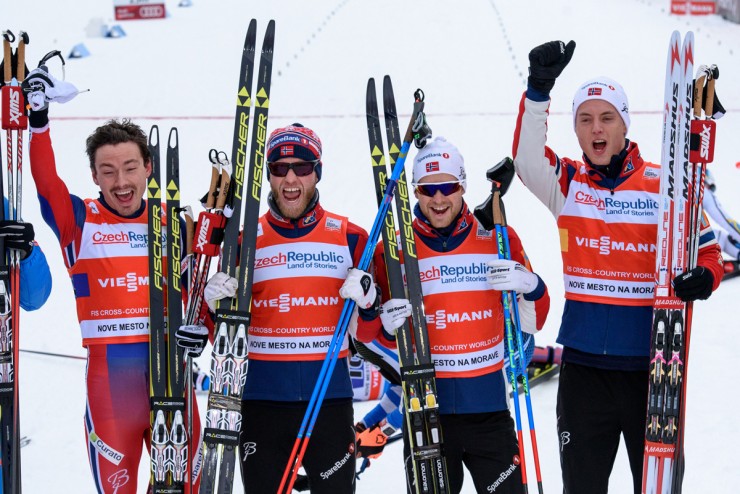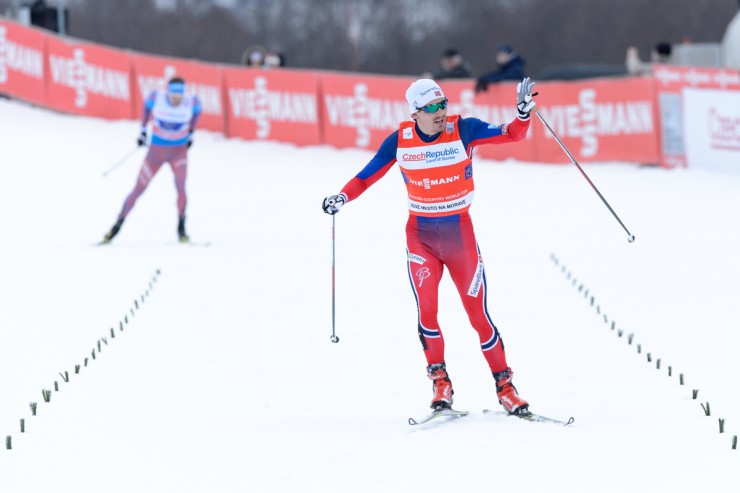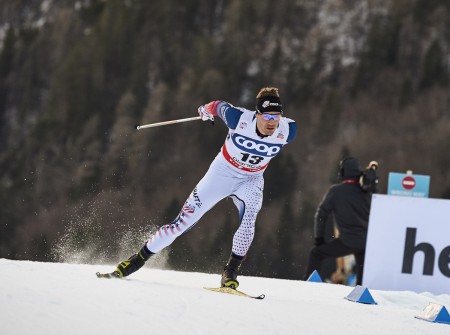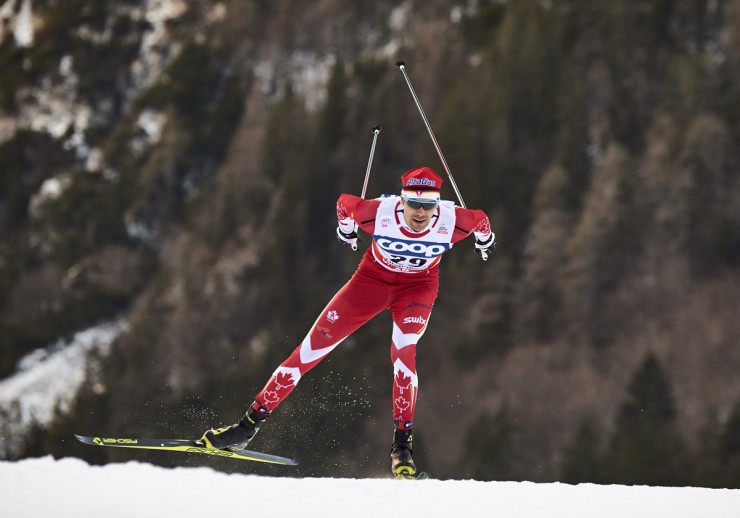
As Martin Johnsrud Sundby of Norway double poled away from the men’s field during the second leg of the Sunday’s 4 x 7.5 kilometer World Cup relay in Nove Mesto, Czech Republic, it looked like the men could rival the Norwegian women team’s 42-second winning margin. However, the Russians weren’t about to let them off without a fight.
The race consisted of two classic legs followed by two freestyle legs with each technique utilizing a different course. With only one steep hill on the classic course, many of the second-leg classic skiers chose to double pole, including Sundby.
At the end of the first leg, his teammate on Norway’s first team, Sjur Røthe came into the initial exchange in fourth, 1.3 seconds after Evgeniy Belov — who established a first-leg lead for Russia — and just behind Kazakhstan’s Alexey Poltoranin and Italy’s Dietmar Nöckler, respectively.
Røthe handed off to Sundby, and the Overall and Distance World Cup leader immediately got to work shattering the field, demonstrating his double poling strength and establishing a 28-second lead over Russia I. Meanwhile, Russia’s Alexander Legkov chased alone, putting 25 seconds between himself and the chase group of Italy, Germany and France.
The Norwegian and Russian first teams maintained their wide margins throughout the third leg, but the chase group grew to seven. After receiving the tag in sixth and seventh, respectively, Noah Hoffman of the U.S. and Canada’s Len Valjas closed the gap to fifth within the first 2.5 kilometers of their skate leg. Fifteen seconds back at the third exchange, they caught the German-Italian-French chase pack by the 2.5 k timing point, and were suddenly in contention for third. Switzerland and Norway II also joined the group by the third exchange.
Meanwhile, just 2.5 k into the third leg, 20-year-old Alexey Chervotkin of Russia remained 27 seconds ahead in second, yet 39 seconds behind Norway’s 25-year-old Mathias Rundgreen in first. By the final exchange, Chervotkin had gained on Rundgreen slightly, leaving anchor Sergey Ustiugov 30 seconds down.
Germany, Italy and France had broken away slightly from the larger group — putting three seconds between them and Norway II in sixth. At the tag, third through ninth were all around a minute out of the lead, with Canada in seventh (+1:01.8) and the U.S. in eighth (+1:02.2).

Finn Hågen Krogh stepped up as Norway I’s anchor, with Petter Northug skipping the weekend to focus on the Ski Tour Canada. With 30 seconds on Russia and 57 seconds to third, it appeared the gold and silver were set. However, at every time check, the margin between Norway and Russia dwindled until it appeared Ustiugov just might pull off the upset. Despite posting the fastest split by more than 12 seconds, Ustiugov ran out of real estate, finishing just six seconds after Krogh, who sealed the win for Norway in 1:08:29.
Krogh celebrated across the line, and in a post-race interview with Altaposten, he said he was relieved.
“When I woke up this morning, I was tired… so I felt the pressure,” Krogh said. “With those guys, I know that nothing less than a win is good enough.”
“The plan was to keep a steady a pace in the first lap and then speed up,” Ustiugov told FIS. “I gave everything I had and tried to close the gap on Finn, but it was too much. Nevertheless, second place feels great.”
Meanwhile, seven teams engaged in a tight battle for third. The U.S. and Canada lost contact over the last 3 k and five teams entered the stadium together for the sprint finish. Italy’s Federico Pellegrino again demonstrated his sprinting prowess to take third (+54.3), edging Germany’s Thomas Bing in fourth and Norway II’s Anders Gløersen in fifth — both of which finished exactly 0.3 seconds later. Switzerland placed sixth (+58.5) and France was close behind in seventh (+59.4).
Simi Hamilton anchored the U.S. to eighth (+1:13.6) followed closely by Canada’s U23+ Development Team skier Knute Johnsgaard in ninth (+1:15.1).
North Americans Stick Together for Top 10
The two North American teams went through each exchange within one place of each other, eventually finishing within 1.5 seconds apart. Canada’s ninth place marked its second-best men’s relay finish in a World Cup, according to Cross Country Canada.

“The Canadian team skied really well today so that is cool to see,” Hamilton said in a phone interview after the race. “It always great to battle with anyone out there, but when it is a fellow North American, it makes it even more fun.”
Scott Patterson (Alaska Pacific University) started first for the U.S. in his first World Cup relay on his first World Cup weekend. Patterson kept the Americans in contention, tagging off in 12th and 24.8 seconds back, while managing the challenges of the mass-start lead-off leg.
“On the third lap, the leading teams lead a charge up the steepest hill,” Patterson explained in an email. “Due to my position, I could only watch it happen as the path forward was blocked … I tried for the rest of the race to close a bit, but usually found that I had some company either blocking my way or pulling me along.”
Patterson handed off to Erik Bjornsen, who picked off six places with the fifth-fastest second leg to lift the U.S. to sixth. Meanwhile, Canada’s Graeme Killick came through the first exchange 1.2 seconds after Patterson and tagged Devon Kershaw in 13th. Kershaw then skied the fourth-fastest second leg to improve to seventh.
“We like how Killick races mass starts, and he is the future of the men’s distance skiers, so we thought it was right to put him first,” explained Canadian coach Chris Jeffries, head coach of the Alberta World Cup Academy who has been assisting the team in Europe.
With the field fragmented between France in sixth to Finland in 11th, Bjorsen and Kershaw of Canada the opportunity work their way up.
“I wanted to ski smooth and relaxed that first lap — knowing that people would be eager to chase back to that next group ahead,” Kershaw wrote in an email. “We were splintered a bit with smaller groups of people around so I was able to just pick off guys as I went.”

Handing off to the third leg, the U.S. and Canada had moved up to sixth and seventh, respectively, just 15 seconds out of third. After the exchange, Hoffman and Valjas quickly bridged the gap to France, Italy, and Germany.
“I felt great out there, Noah helped pull me up to the third place group, he was skiing so well. I cant take any credit for catching that group, he was the one leading that charge,” Valjas explained in an email.
Both North American skiers posted freestyle splits that ranked in the top-10 overall. Valjas skied the third-fastest third leg; Hoffman’s was fourth fastest. Considering Valjas’s recent travel schedule, it was a surprising result. “I flew in late the night before just to race the relay. I felt surprisingly good considering I had been either in a car or plane, or airport for 14 hours that day,” he wrote.
Coming into the final exchange, Valjas and Hoffman were in the mix of seven teams vying for the final podium placing.
“Scott, Erik, and Noah skied really great legs and got me in a really good spot, we were in contact with the big group behind the Norwegians and Russians so they did an amazing job keeping us in there,” Hamilton said.
In the final leg, the North American anchors Hamilton and Johnsgaard received the tag in the midst of the chase pack and would ski the duration of the race together.
Hamilton was able to maintain contact with the group despite a broken pole the first lap of three laps. He quickly received a replacement from the French team, but had to swap it out again before finding one with a suitable length.
“It was actually in a really lucky place because it was mostly downhill back to the stadium so I don’t think I lost too much time or energy in that debacle,” Hamilton said.
The pair lost contact with the chase group about 4 k in, but kept the deficit within 20 seconds. Hamilton surged up the final hill to overtake Johnsgaard for eighth.
“Our men’s team is definitely improving and we are learning a lot each time we do it and it definitely keeps us hungry, especially me, to work harder at the distance races so I can be able to ski 7.5 k fast but efficient and be able to put in a really good sprint at the end,” Hamilton said.
“The pack containing three through nine and Simi, we really believe that when we can figure out the distance skiing just one or two steps further, that he’ll be able to conserve for more of the race and then attack when it counts,” U.S. coach Matt Whitcomb said. “Today would have been a race that would have been the perfect scenario for that. We’re not quite there yet; he was able to stay within just seconds of that sprint for the finish.”
Jeffries echoed Whitcomb’s optimism: “All four men skied great today. Individually, they all had really strong days, and that is a nice to have. Obviously as a nation, we want to be better than 9th, but we were right there until the end and we had a shot at a podium. The boys and staff were all really happy, big smiles are always nice on the World Cup where you can have some tough days.”
“It was a really fun 7.5km blast session and nice to see the whole team ski really well,” Kershaw wrote. “Just one of those days where ski racing is a real treat. Loved it.”
Kaitlyn Patterson
New to the FasterSkier team, Kaitlyn is a silent sports all-arounder, competing in cross-country skiing, cycling and triathlon since graduating from the University of Michigan, where she ran cross country and track. Kaitlyn is intrigued by the complexities of cross-country ski racing and is excited to start in the elite women’s field at the 2016 Birkie.



